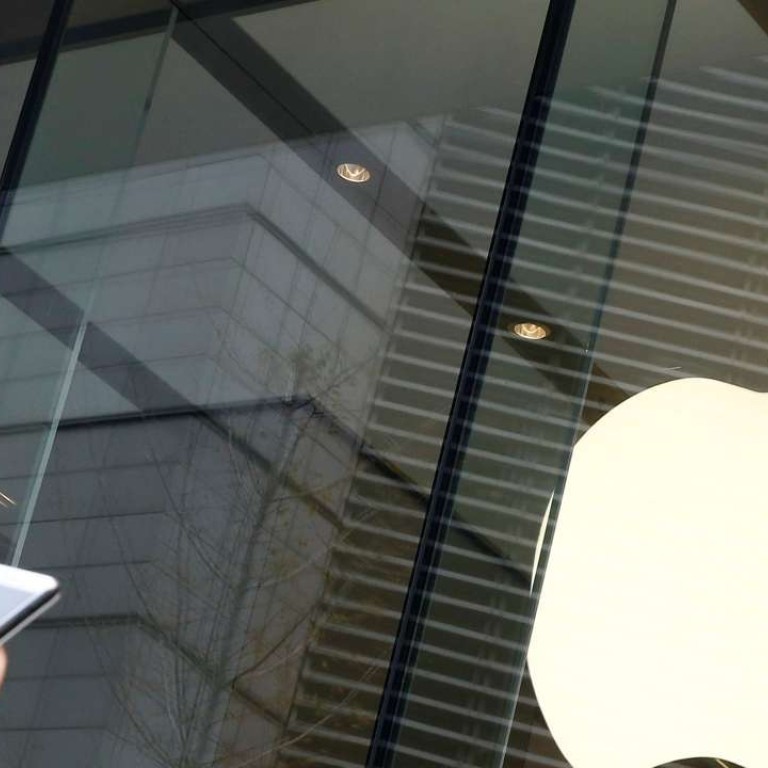
Apple boosts credentials in China with new Beijing research centre
Tech giant’s first development facility in Asia follows its US$1bn investment in Chinese ride-hailing app operator Didi Chuxing
Over the next several years, the new whiz-bang Apple device in the market could conceivably have this marketing tag printed on the back: “Designed by Apple in China. Assembled in China”.
Technology giant Apple is expected to eventually push forward that agenda through its recently formed research and development centre at the Zhongguancun Science Park in Beijing, analysts told the South China Morning Post.
The existence of this facility was announced by the Zhongguancun Science Park Administrative Authority this week through a post on WeChat, the popular social messaging platform known as Weixin on the mainland.
Establishing Apple’s first research and development facility in Asia was one of the strategic new investments in China that chief executive Tim Cook mentioned to vice-premiere Zhang Gaoli at their meeting in Beijing in August.
That centre will focus on developing computer hardware and software, audio and video equipment, consumer electronics devices, telecommunications products and other advanced technologies, according to the Zhongguancun Science Park.
Apple did not provide a statement.
“It makes sense for Apple to create products for China, its second-biggest [geographic] market,” said Kitty Fok, managing director at technology research firm IDC China.
Apple’s China market, comprising the mainland, Hong Kong and Taiwan, contributed US$8.85 billion in sales to the overall revenue of US$42.46 billion in the company’s third fiscal quarter ended June 25.
More importantly, Fok said Apple is burnishing its credentials in the country with another major initiative after its US$1 billion investment Didi Chuxing in May.
Apple joined Alibaba Group and Tencent Holdings among the biggest stakeholders in ride-hailing app provider Didi, which serves nearly 300 million users in more than 400 Chinese cities. Alibaba is the owner of the Post.
The cost of building Apple’s research and development centre, which will house about 500 staff, will reach US$45 million, a Wall Street Journal report said.
Paul Haswell, a partner at international law firm Pinsent Masons, said Apple’s domestic research initiatives could potentially lead to a change in the marketing tag on the back of its future devices.
The tag found on the iPhone, iPad, iPod and Mac computers shows “Designed by Apple in California. Made in China.”
It makes sense for Apple to create products for China, its second-biggest [geographic] market
“The relationship between Beijing and non-Chinese tech firms has not always been a good one,” Haswell said. “Apple may also see this research and development investment as a way to ensure continued support for the sale of its products in China, despite local competition and the government’s occasional hostility towards Western-developed technology.”
“What will be interesting is if the majority of leaks relating to new Apple products would increase in frequency and accuracy when that research and development centre is up and running,” he said. “The leaks about new devices have typically been from people at the Chinese factories assembling those products.”
Charlie Dai, a principal analyst at Forrester Research, said the facility “will not only help Apple better leverage local talent, it will also create substantial job opportunities across the country’s capital and contribute to the local GDP [gross domestic product]”.
“Overall, it’s an investment that could help increase the trust for Apple’s products and services in the domestic market,” Dai said.
He pointed out that most of the global information and communications technology companies were ahead of Apple in setting up a research and development base on the mainland.
“This move will help Apple pursue new partnerships with both global and domestic companies in the Chinese market,” he said.
Apple has been increasing its efforts in the enterprise market over the past two years, backed by major alliances with the likes of IBM, SAP and Deloitte.
“We could potentially see Apple involved in creating customised local solutions for Chinese enterprises, not just consumers,” Dai said.
Jin Yi, owner of Jinyi Tech in Shenzhen’s Huaqiangbei electronics district, said interest could be high for Apple’s domestic research efforts. “If Apple focuses on developing smart devices for the mainland market then I will definitely keep an eye on it,” Jin said.
In recent launches of the iPhone, iPad and Apple Watch, the Silicon Valley-based Apple has promoted increased support for Chinese apps, including WeChat, Alipay and Weibo.
Additional reporting by He Huifeng

